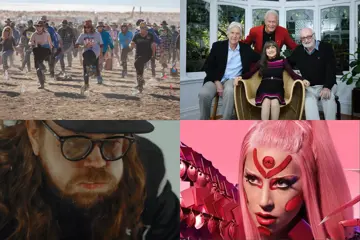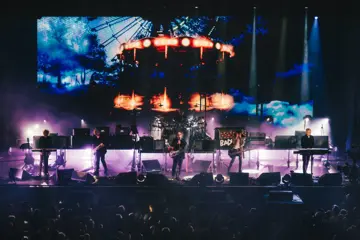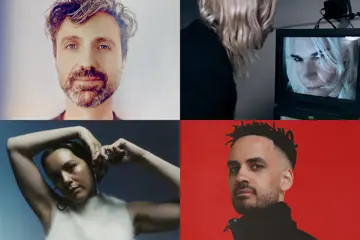By his own admission, there was a time when Patrick Abboud thought he was “the only gay Arab in the world”.
In the closet for much of his life, the Walkley-nominated journalist, known for his work on triple j's Hack and the SBS news program The Feed, wrestled with the way his sexuality was regarded by his community and his family. “My dad is Palestinian, my mum is Lebanese,” he says. “And my parents are amazing but it hasn't always been the way it is now. It's only recently that I've been out to my family.”
Before that happened, however, Abboud took a big step, albeit secretly. A decade ago, he and a group of friends organised the first “Middle Eastern-themed float” in the Sydney Gay And Lesbian Mardi Gras. “We were all in the closet, and we were all disguised as sheikhs so no one could recognise us,” he says.
It was a breakthrough for Abboud, who came out to his family a few years later. “I should probably say that my parents – who aren't conservative but not as lefty as I am – are the way they are because we had a really horrible tragedy in our family and my eldest brother passed away,” he says.
“When that happened, it really shook us up. It was a couple of years after that that my parents found out about my life, and I think because we went through that experience my parents had the feeling that they didn't want to lose another son. And if they didn't find a way to accept who I am, they would. Because I'd made the decision that this is my life and I have to start living it.”
Don't miss a beat with our FREE daily newsletter
And a big part of that is Abboud's decision to co-host SBS' coverage of this year's Mardi Gras alongside stand-up comedian Tom Ballard and UK actress and musician Heather Peace on SBS 2 on Sunday March 2. The station will not only broadcast the parade in all its glory but feature a variety of reports and interviews on issues concerning the LGBTQI community.
“SBS 2 is all about diversity and emerging cultures and giving a voice to people who don't have one,” says Abboud.
“For me, that's what Mardi Gras has been about since the beginning. It's about the fact that I can live the way I live now. It's about remembering people who fought for our freedoms, and I think that can be forgotten in the glamour and the spectacle of it all. I know there are people who have been through much worse and they stood up for the rights that me and my friends enjoy today. So it's about celebrating that, and it's about having a presence.”
Since that first Middle Eastern Mardi Gras float a decade ago, things have moved ahead to some degree. Abboud points out that are several “culturally-specific” floats taking part in the 2014 parade, and that within the gay Arabic-speaking community there is “a whole gamut of things going on – events, parties, people creating safe places for people”.
“It's still quite underground in the sense that we're not going into Arabic-speaking communities and having such events within our own communities,” adds Abboud. “That's the next step, I think. People want to do it but we're not there yet.”
And that's why he views his very public participation in the coverage of the 2014 Mardi Gras as part of helping the whole process continuing to progress.
“All of my Arab friends are still not out to their families,” he says. “Coming out is difficult for anyone. But in most Arab countries, it's still against the law to be gay; there are severe punishments that come with that. So when you have that additional layer in your culture, it's even harder. My family has known for around five years, and they're understanding but at the same time they would rather I not be hosting the Mardi Gras. The reason I'm doing it now is that I never thought it was possible; I never thought I would come out to my family. They didn't need to know, so why would I? But I've kind of gone 180 degrees because my life is so much better for having done that.”
With that in mind, Abboud hopes to inspire others who may be struggling. “I'd like to think I could be a bit of a role model for people who are not just from Arab backgrounds but culturally diverse backgrounds who have that kind of baggage when they're trying to come out,” he says.
“Many of these young people go into fake marriages or marriages of convenience and go on living their lives in a really horrible way because they can't bring themselves to take that risk of losing their family by coming out. I've had discussions with young people who would never think about coming out to their families. If you're exploring your sexuality and it's something you feel could hold you back from what you want to do, it is possible to have it all. So my whole story is essentially the whole reason I'm deciding to put myself out there.”
There is a more expansive reason for Abboud's participation in this year's Mardi Gras coverage, however. “For the wider community, seeing something that isn't just a stereotyped image of what it is to be gay or lesbian is really important, especially in the climate we live in,” he says.
“You see it in Russia, Uganda and other parts of the world; we have the privilege in this country to be able to live freely. We should put that out there. Some people come to see the spectacle of the parade, and I'm not passing judgement on that, but Mardi Gras exists for a reason and it's important to remind people of that. I love a great party, and I will have a great time, but that's only one component. We need to reflect all aspects of the community, and the broadcast will do a great job of that.”
The 2014 Sydney Gay And Lesbian Mardi Gras parade airs 8.30pm, Sunday on SBS 2.















